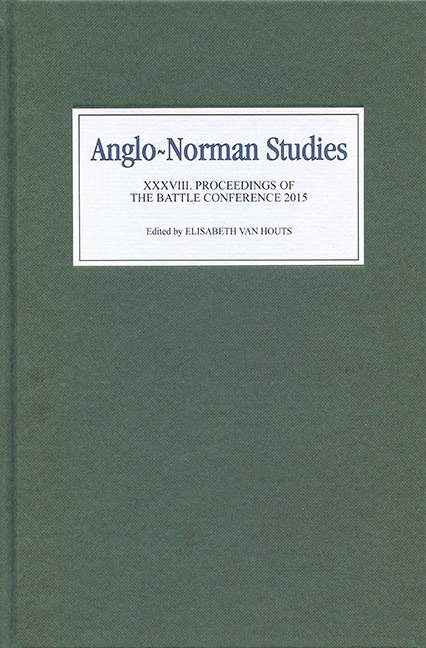Book contents
- Frontmatter
- Contents
- Illustrations and Tables
- Editor's Preface
- Abbreviations
- From the Articles of the Barons to Magna Carta (The R. Allen Brown Memorial Lecture, 2015)
- Jews in the Glosses of a Late Twelfth-Century Anglo-Norman Gratian Manuscript (Cambridge, Gonville and Caius College, MS 283/676)
- Monastic Autonomy, Episcopal Authority and the Norman Conquest: The Records of Barking Abbey (The Marjorie Chibnall Memorial Essay, 2015)
- Economy Distorted, Economy Restored: Order, Economy and Salvation in Anglo-Norman Monastic Writing
- Monastic Patronage and Family Disputes in Eleventh- and Early Twelfth-Century Normandy
- Constance, Princess of Antioch (1130–1164): Ancestry, Marriages and Family
- Early Aristocratic Seals: An Anglo-Norman Success Story
- English Towns and Urban Society after the Norman Conquest
- Wreck of the Sea in Law and Practice in Eleventh- and Twelfth-Century England
- Social Life and Religious Culture in Twelfth-Century Norwich and Norfolk
- Bad Crusaders? The Normans of Southern Italy and the Crusading Movement in the Twelfth Century
- Turold, Wadard and Vitalis: Why Are They on the Bayeux Tapestry?
From the Articles of the Barons to Magna Carta (The R. Allen Brown Memorial Lecture, 2015)
Published online by Cambridge University Press: 12 September 2017
- Frontmatter
- Contents
- Illustrations and Tables
- Editor's Preface
- Abbreviations
- From the Articles of the Barons to Magna Carta (The R. Allen Brown Memorial Lecture, 2015)
- Jews in the Glosses of a Late Twelfth-Century Anglo-Norman Gratian Manuscript (Cambridge, Gonville and Caius College, MS 283/676)
- Monastic Autonomy, Episcopal Authority and the Norman Conquest: The Records of Barking Abbey (The Marjorie Chibnall Memorial Essay, 2015)
- Economy Distorted, Economy Restored: Order, Economy and Salvation in Anglo-Norman Monastic Writing
- Monastic Patronage and Family Disputes in Eleventh- and Early Twelfth-Century Normandy
- Constance, Princess of Antioch (1130–1164): Ancestry, Marriages and Family
- Early Aristocratic Seals: An Anglo-Norman Success Story
- English Towns and Urban Society after the Norman Conquest
- Wreck of the Sea in Law and Practice in Eleventh- and Twelfth-Century England
- Social Life and Religious Culture in Twelfth-Century Norwich and Norfolk
- Bad Crusaders? The Normans of Southern Italy and the Crusading Movement in the Twelfth Century
- Turold, Wadard and Vitalis: Why Are They on the Bayeux Tapestry?
Summary
The Articles of the Barons record royal concessions to baronial demands in 1215 and form the basis for Magna Carta. They reveal at least some of the aims of the first English baronial rebellion with a clear programme of governmental reform. Their survival also for the first time allows analysis of the development of a major English legal document from draft to final version.
This essay begins by examining the drafting of the Articles, and suggests who may lie behind their composition. It then compares the form and contents of Magna Carta with the Articles. Finally it makes suggestions as to how the redrafting may have been carried out, and who influenced it. Comparison of the Articles and Magna Carta is not new. The contribution of the present paper reflects its origins: its starting point with the Articles rather than Magna Carta; its underlying interest in the drafting of legislation as much as in the politics of 1215; and its analysis of both the minutiae of the texts and the broader ideas that examination of those minutiae reveals.
The Articles
The Articles of the Barons are written on a single sheet of parchment, under the heading ‘These are the articles that the barons seek and the lord king grants.’ They probably owe their survival to Archbishop Stephen Langton (1207–28), into whose hands they seem to have passed in 1215. The form of the document is unusual, in that it is set out article by article, each introduced with the paragraphus symbol, making it much easier to consult than the solid block of text that characterizes charters, including Magna Carta. The form was presumably intended to facilitate further discussion, which would lead to the already-envisaged Charter [i.e. Magna Carta]. Particularly in the earlier part of the document there is some logic to the ordering of the clauses into groups, although also elements of apparent disorder.
The Articles are in the handwriting typical of, although not exclusive to, clerks of the royal chancery.
- Type
- Chapter
- Information
- Anglo-Norman Studies XXXVIIIProceedings of the Battle Conference 2015, pp. 1 - 18Publisher: Boydell & BrewerPrint publication year: 2016



